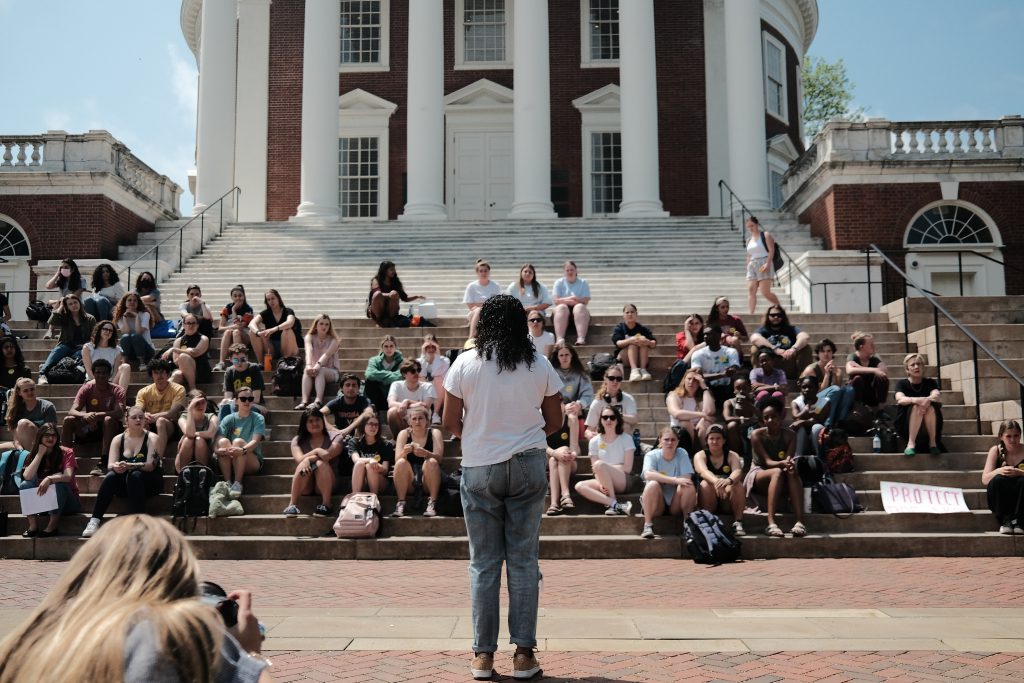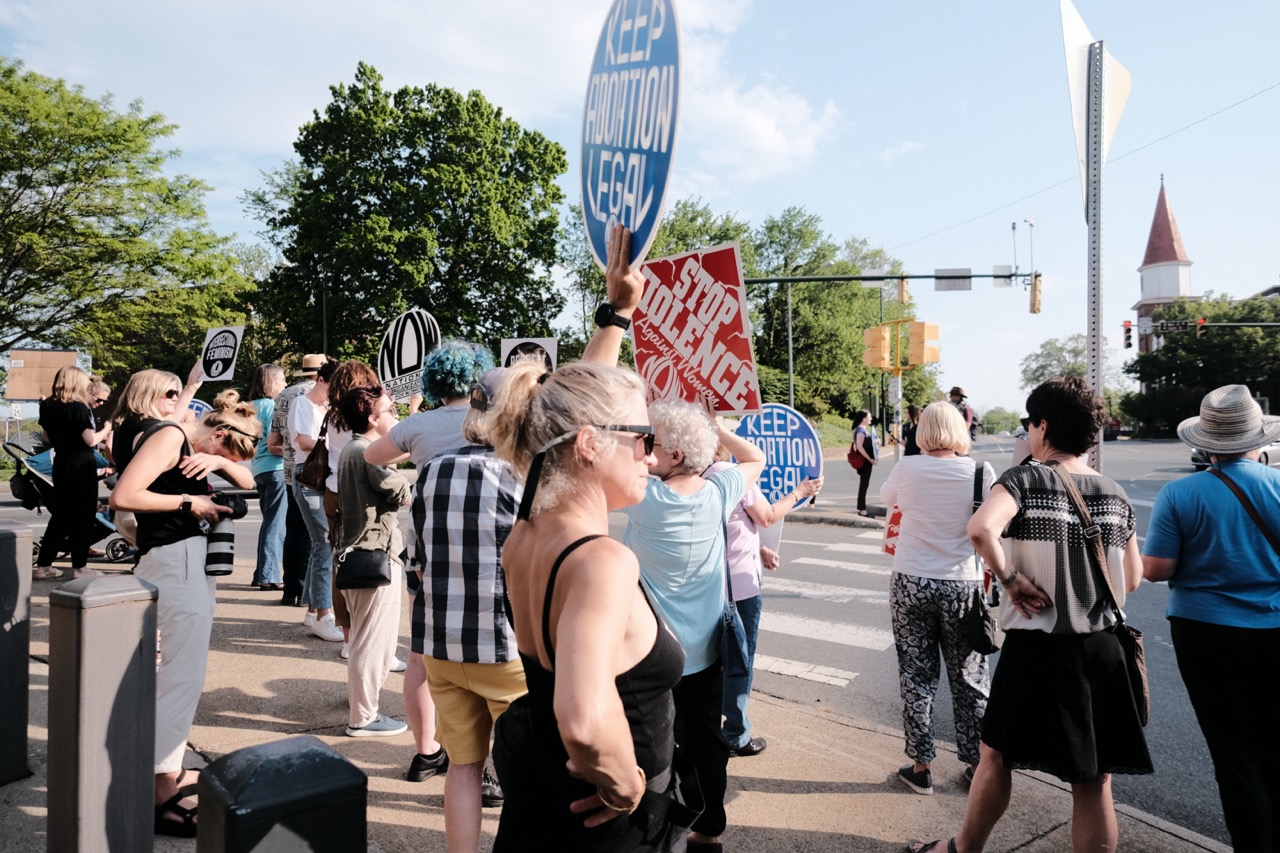Hours after a leaked U.S. Supreme Court draft opinion made real the likelihood that Roe v. Wade will be fully overturned by summer, reversing decades of legal protection for a woman’s right to control her own body, protesters gathered in front of the federal courthouse in downtown Charlottesville.
“This is so major, because if you read the draft…it basically says that Roe v. Wade is not legitimately based in the original decision back in 1973,” says Kobby Hoffman, founder of the Blue Ridge Abortion Fund, which provides funding to allow low-income women to access abortions.
The immediate past president of the local chapter of the National Organization for Women, Hoffman is currently a NOW delegate representing eight states. She helped organize the courthouse protest and spoke over cars horns honking in support and her fellow protesters’ chants.
“Of course, we have no idea where it will end up,” Hoffman says of the draft opinion. “It’s very extreme. I would say, if you care about women in your household or that you know, or if you are a woman, you should definitely be on high alert and acting because your future is at stake.”
As pro-choice advocates across the country reacted with alarm to the majority opinion drafted by the George W. Bush-appointed uber-conservative Justice Samuel Alito and signed by justices Neil Gorsuch, Clarence Thomas, Brett Kavanaugh, and Amy Coney Barrett, Republican elected officials who have long voiced opposition to abortion also expressed outrage, not over the content of the draft, but with the leak itself.
“I am in utter disbelief that the sacred confidentiality of the Supreme Court would be violated in this manner,” Virginia Governor Glenn Youngkin said in a release the day the draft leaked, alleging it was “done in order to cause chaos and to put pressure on justices and elected officials.”
Youngkin insisted speculation on the Supreme Court’s final decision is “premature,” and wrote that he prefers to direct attention elsewhere. “While we wait for the final June decision, we will be focused on lowering taxes for Virginians, funding education and law enforcement because we need to get a budget passed,” his statement reads.
Unlike dozens of other states, Virginia has no “trigger law” that kicks into place outlawing abortion immediately if Roe is overturned, so abortion will remain legal in the commonwealth in the immediate future unless new legislation is passed.
“Virginians—please know your right to abortion is protected in state law for now,” tweeted Delegate Sally Hudson. “Holding our Senate and flipping the House is how we keep it that way.”

At a town hall appearance on Wednesday, 7th District Representative Abigail Spanberger also weighed in, urging action at the federal legislative level.
“This leaked draft Supreme Court opinion is poised to erase a woman’s right to privacy and reproductive health care that has been settled law for nearly a half century. The U.S. House of Representatives has voted to codify Roe v. Wade. The U.S. Senate needs to follow suit and pass this bill.”
Local conservative elected officials stayed mum or stuck to comments on the ethical breach the leak represents. Delegate Rob Bell declined to comment on the draft opinion or any state legislative efforts that might follow such a final decision from the Supreme Court. State Senator Bryce Reeves did not respond to a reporter’s request for comment.
But activists who have fought to outlaw abortion in Virginia and beyond voiced hope that the draft ruling will represent the court’s final decision.
“We are not the ones that have a right to define who lives and who dies,” says Abe Nelson of the grassroots group Charlottesville Pro-Life, which is opposed to abortion in all cases, including rape and incest. Nelson hopes the leak won’t change the conservative justices’ support for the opinion, and he believes the right to access abortion should be determined by individual states.
“It’s right to bring this back to a status where we as a people, as individuals and citizens, can speak into this issue more directly,” Nelson says. “Now, I would hope that our direction in that would be one that affirms the value of life from the moment of conception.”
UVA Media Studies Professor Siva Vaidhyanathan, co-creator of the Democracy in Danger podcast, says the leaked Supreme Court draft opinion is further evidence of the decline of U.S. democracy. A majority of the American public supports the right to choose, he says, and he points out that the basis for Alito’s opinion would also undercut other hard-won civil rights.
“Even though same-sex marriage is remarkably popular around the country, it is vulnerable because you can no longer rely on that basic principle that what consenting adults do in their homes is not the business of the government to restrict,” Vaidhyanathan says. “And so, you know, I see this as softening up the process for addressing…LGBTQ issues rather directly and maybe going beyond that, maybe looking at restricting certain forms of contraception.”
Hoffman says the looming reversal of Roe is more evidence of the need for the Equal Rights Amendment, which would enshrine women’s rights in the Constitution.
“Everyone needs to be aware that there’s something called ‘strict scrutiny,’” she says. “And that applies to race and to religion. And if we had the Equal Rights Amendment and it said that you could not discriminate on the basis of sex, then you would be able to go back on things like abortion and say, please look at this again, because you need to apply strict scrutiny, not something lesser, and maybe the outcome would be different.”
With the Supreme Court’s final decision in Dobbs v. Jackson due by the end of term this summer, activists on both sides of the issue are preparing for a post-Roe world.
Nelson says he doesn’t believe the statistics that show low-income women will be disproportionately affected by the end of legal abortion or that a forced pregnancy will have a negative impact on a woman’s life.
“If we were to pour…even a fraction of the resources that currently go into this battle that we’re engaged in over Roe versus Wade…into supporting life in a post-Roe world, we would be in a much better position supporting organizations that come alongside women and men affected by unplanned and crisis pregnancies,” he says.
Hoffman says engaging voters in local, state, and national elections is critical.
“It matters. It really matters,” she says. “And everything that we do, it adds up. And we can make a big wave that will make people realize how big this is, how important this is to all of our lives and to our future, for our future, for our country and its democracy and so many different aspects.”
Courteney Stuart is the host of “Charlottesville Right Now” on WINA. You can hear interviews with Kobby Hoffman, Siva Vaidhyanathan, and Abe Nelson at wina.com.
